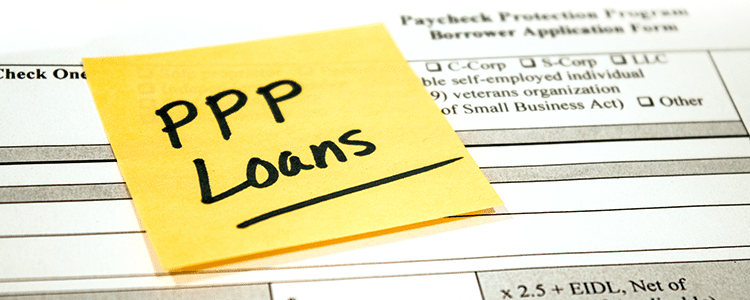 Following significant backlash from business owners, members of Congress, accountants, academics and others, yesterday, Congress passed H.R. 7010, otherwise known as the Paycheck Protection Program Flexibility Act of 2020, and is expected to be signed into law by the President, today, June 4, 2020. H.R. 7010 is a bill that modifies the CARES Act in relation to the Paycheck Protection Program (PPP) forgiveness rules. Although the methodology to apply for a PPP loan has not changed and anyone who has already received a PPP loan may generally choose to apply the prior rules, many view H.R. 7010’s changes as an overall positive for business owners.
Following significant backlash from business owners, members of Congress, accountants, academics and others, yesterday, Congress passed H.R. 7010, otherwise known as the Paycheck Protection Program Flexibility Act of 2020, and is expected to be signed into law by the President, today, June 4, 2020. H.R. 7010 is a bill that modifies the CARES Act in relation to the Paycheck Protection Program (PPP) forgiveness rules. Although the methodology to apply for a PPP loan has not changed and anyone who has already received a PPP loan may generally choose to apply the prior rules, many view H.R. 7010’s changes as an overall positive for business owners.
What Changed?
- Term of Repayment Period – Under the previous rules, PPP loans came with a 2 year payback term and a 6 month first payment deferral. However, all PPP loans entered into after the effective date of H.R. 7010 will have a payback term that is 5 years from the date the PPP proceeds are received. In addition, the first payment for any portion of the proceeds that are not forgiven will be due upon the earlier of: (i) the date on which the forgiveness funds (if any) are remitted to the lender; or (ii) 10 months after the end of the recipient’s “Covered Period”. However, for any PPP loans entered into prior to the effective date of H.R. 7010, the law provides ample leeway for lenders to agree in coordination with the recipient to modify the loan documents to extend the payback period to be consistent with the new rules.
- “Payroll Costs” Minimum Percentage Decreased – Under the previous rules, a PPP recipient must use at least 75% of the PPP proceeds on “payroll costs” to be eligible for maximum forgiveness. However, H.R. 7010 changes 75% to 60% percent of the PPP proceeds being used for payroll costs, and the recipient may use up to 40% of such amount for any payment of interest on any covered mortgage obligation (which shall not include any prepayment of or payment of principal on a covered mortgage obligation), any payment on any covered rent obligation, or any covered utility payment.
- “Covered Period” Extended to 24 Weeks – Under the previous rules, in order to obtain PPP forgiveness, recipients must have spent the proceeds within 8 weeks of receipt (the “Covered Period”). R. 7010 modifies this Covered Period to the earlier of: (i) 24 weeks from the date the PPP proceeds are received; or (ii) December 31, 2020. This modification is automatic for all PPP recipients and is obviously great news for many businesses that were mandated to close during their initial 8 week Covered Period. In addition, recipients can choose based on their facts and circumstances whether they want use the 8 or 24 week Covered Period to determine forgiveness. It is currently unclear if this modification permits business owners to increase the maximum amount of payroll costs paid to a single employee/owner to an amount greater than $15,384 (i.e. 8/52 * $100,000 threshold), additional guidance is expected in this regard.
- Extension of Time Period to Re-hire Employees – Under the previous rules, employers had until June 30, 2020 to re-hire (or obtain documentation stating that the employees refused to come back to work) its previous employees to meet the full-time employee forgiveness and wage thresholds (discussed in detail in our previously released guidance). Therefore, under H.R. 7010, so long as the full-time employee and wage thresholds are restored to their previous level at any time prior to December 31, 2020, no reduction in forgiveness will be required.
- Additional Relief for Businesses Unable to Re-open – Under H.R. 7010, PPP forgiveness shall be determined without regard to a proportional reduction in the number of full-time employees if an eligible recipient, in good faith is able to document: (i) an inability to rehire individuals who were employees of the eligible recipient on February 15, 2020; and (ii) an inability to hire similarly qualified employees for unfilled positions on or before December 31, 2020. Forgiveness is also not reduced based on the foregoing if the recipient is able to document an inability to return to the same level of business activity as such business was operating at before February 15, 2020 due to compliance with requirements established or guidance issued by the Secretary of Health and Human Services, the Director of the Centers for Disease Control and Prevention, or the Occupational Safety and Health Administration during the period beginning on March 1, 2020, and ending December 31, 2020, related to the maintenance of standards for sanitation, social distancing, or any other worker or customer safety requirement related to COVID–19. Additional guidance on this modification is expected in the near future.
As with the original release of the CARES Act, additional FAQs and guidance regarding the application of the modifications present in H.R. 7010 is expected in the coming weeks. FLB’s attorneys have extensive experience in all matters relating to PPP, H.R. 7010 and the CARES Act. We can provide guidance to businesses and business owners faced with these issues brought about by the COVID-19 pandemic, including loan forgiveness. Please contact us using the form below, or give us a call at 610-797-9000. We wish you well during these extraordinary times.
Oops! We could not locate your form.









